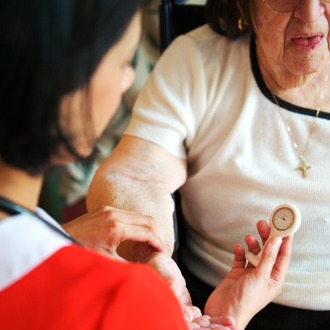Exclusive GPs will need to record yearly reviews and assessments for around 0.5% of their practice population, under new core work agreed for the GMS contract.
GPC negotiators said this amounts to only a small number of patients for each practice, about 3% of over-65s, and that the reviews constitute work that GPs are already doing in these patients.
According to the GPC, practices in England will simply need to make sure they record and code the reviews correctly, although they conceded that practices may need to carry out work to set up the necessary coding system.
The new contractual work comes in from July and will replace the much-maligned avoiding unplanned admissions (AUA) DES.
Funding from the DES – some £157m – is being absorbed into the global sum, but in return, all practices now need to make sure they fulfil the new contractual obligations on frailty.
These include keeping a register of the number of people with a diagnosis of moderate frailty and those with severe frailty, and recording the number with severe frailty who have an annual medication review, have fallen within the past year and who have provided consent to a full Summary Care Record.
NHS Employers told Pulse that more detailed guidance would be issued closer to the contract start date.
Dr Richard Vautrey, deputy chair of the GPC told Pulse the population of severely frail patients would account for around ‘half a percent of the average practice list’.
Dr Vautrey added that this is about 3% of the over-65s population, based on an evaluation of the electronic Frailty Index (eFI) that NHS England recommends.
Meanwhile GPs who use the tool will identify around 12% of over-65s for the register of moderately frail patients, according to the evaluation.
Although GPC has agreed that practices are free to use another ‘appropriate’ tool, the eFI tool is already embedded into EMIS and SystmOne, and GP IT providers are expected to make sure GPs will be able to run this, or an alternative tool, ‘as this is now a contractual obligation’, Dr Vautrey said.
Dr Vautrey said the vast majority of GPs had been engaged in the AUA DES and as such, the new work ‘will be a significant workload reduction for all practices’.
He said the GPC has ‘already received a lot of favourable feedback from GPs when we have been talking about this since the contract was announced – it was one of the big items for them, they were really concerned about the workload implications of the AUA DES, its practicality, its bureaucracy and they are very relieved to get rid of it’.
He added that GPs felt that the new work was ‘wholly clinically appropriate – these patients with severe frailty are those practices will be seeing on a regular basis… so this shouldn’t add any extra workload at all to practices, this is simply about coding their clinical interactions when it is appropriate to do so.’
However, Dr Vautrey said that there ‘isn’t at the moment any common approach to coding for this’, although ‘system providers or practices themselves will develop templates to do this relatively easily – so it will be part and parcel of consultations you would do with these patients anyway’.
Asked whether it could disproportionately affect practices serving populations with high numbers of older patients or care home residents, Dr Vautrey said: ‘No, this should be done as part of regular contact with patients.
‘There are many patients with frailty but only a limited number with severe frailty and other than adding a code for severe frailty to the record is unlikely to be more than they are already doing in terms of medication reviews.’
The GPC says these records will not be used for performance management, although NHS England is to automatically extract the data from GPs’ computer systems for intelligence – meaning GPs will need to make sure they code the work correctly.
But, as previously reported by Pulse, NHS Employers has warned in contract guidance that not carrying out the reviews could lead to breach-of-contract notices.
Dr Peter Swinyard, chair of the Family Doctors Association, told Pulse he agreed the new contractual work should mean a reduction in workload.
Dr Swinyard said practices ‘should already have been doing detailed care plans for all the severely frail’ and he expected there ‘should be a reduction in work as can be a quick question at the annual medication review – therefore considerably less work’.
Contractual obligation to identify and manage patients with frailty
From 1 July 2017 at the earliest, practices will use an appropriate tool eg Electronic Frailty Index (eFI) to identify patients aged 65 and over who are living with moderate and severe frailty.
For those patients identified as living with severe frailty, the practice will deliver a clinical review providing an annual medication review and where clinically appropriate discuss whether the patient has fallen in the last 12 months and provide any other clinically relevant interventions. In addition, where a patient does not already have an enriched Summary Care Record (SCR) the practice will promote this, seeking informed patient consent to activate the enriched SCR.
Practices will code clinical interventions for this group appropriately. Data will be collected on the number of patients:
- recorded with a diagnosis of moderate frailty;
- with severe frailty;
- with severe frailty with an annual medication review;
- with severe frailty who are recorded as having had a fall in the preceding twelve months;
- severely frail, who provided explicit consent to activate their enriched SCR.
NHS England will use this information to understand the nature of the interventions made and the prevalence of frailty by degree among practice populations and nationally. This data will not be used for performance management purposes.
Source: NHS Employers

















